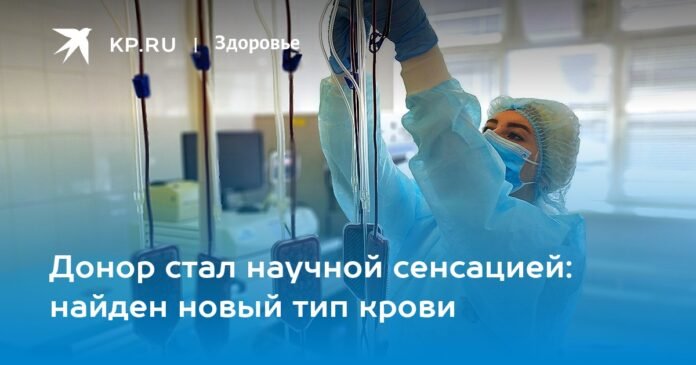In the hospital named after MP Konchalovsky found a blood donor with a hitherto unknown variant of the Rh factor. Photo: press service of the City Clinical Hospital named after MP Konchalovsky
A blood donor with a previously unknown variant of the Rh factor was found in Moscow. A young man came to the MP Konchalovsky Hospital and participated in the donation campaign for the first time. It turned out that he had blood characteristics that he did not even suspect, and that surprised the doctors.
AS WAS
Blood was drawn as usual and examination began in several stages. Also standard.
“The initial examination showed that this young man has a second blood group and is Rh negative,” Dmitry Zhemchugin, a transfusion specialist, told Komsomolskaya Pravda.
– Further tests with comprehensive laboratory tests of blood parameters (which are carried out with every blood donation) showed a positive result for antigen D and it was decided to send the sample for additional molecular genetic studies. As a result, it turned out that the variant of antigen D in this young man belongs to very rare forms. Moreover, it is not even registered in the nomenclature of the International Scientific Society of Blood Transfusion. And perhaps this type of antigen has not been detected before.
Dmitry Zhemchugin: The D-antigen variant in this young man is a very rare form. Photo: press service of the City Clinical Hospital named after MP Konchalovsky
MEDICAL DISCOVERY OR JUST A GHOST?
The Konchalovsky Clinic now speaks very cautiously. In fact, the D antigen variant found in man does not currently appear in scientific data banks. But to confirm or refute the medical finding, it will be necessary to analyze the blood in other Russian blood centers. And then internationally. How long will this take? The expert suggests it will be months.
WHY IS A BLOOD PHENOTYPE NEEDED, ESPECIALLY A SUPER RARE BLOOD PHENOTYPE?
The blood phenotype is a kind of unique passport of human blood. It is determined in part by heredity and genes. So in a sense we are all related by blood and blood transfusion is possible in principle. But there are blood types. So some of us are closer to each other and some are further away. The blood phenotype is partially influenced by lifestyle and the external environment. So even identical twins do not have completely identical blood, although their phenotype is as similar as possible.
When performing blood transfusions, doctors try to select the donor’s blood to be as similar in phenotype as possible to the recipient’s blood.
In this way, the risk of complications after surgery can be reduced, because the human body can produce antibodies against the donor’s blood, so to speak, rejecting it. It turns out that transfusionists look for blood components for transfusion in such a way that they match the recipient’s blood as closely as possible in terms of various antigens. The more different variations of blood phenotypes there are in blood banks, the more successful people will be in recovering from surgery. The more lives saved, the more healthy years saved.
“Thus, this young man, becoming a donor, will be able to help people with a similar rare blood phenotype,” says Dmitry Zhemchugin.
Rare blood phenotypes are stored in the cryobank for 10 years. Photo: Press service of the City Clinical Hospital named after MP Konchalovsky
WHAT OTHER UNIQUE BLOOD TYPES ARE THERE?
In fact, the Rh factor is not as simple as it seems. It is determined by six dozen antigens, including D, which is one of the most important. It is this that can provoke a pronounced immune response.
About 15% of Caucasians do not have any D antigen. This blood is called Rh negative.
In 1961, a case was first described in which there was no Rh gene in the blood (Rhesus). Previously, it was believed that this was impossible in principle, that an embryo with such a characteristic would not survive. Life turned out to be more diverse and wiser. People with zero Rh factor exist, live, work, start families and have children. And they may never know about their uniqueness. It is not known exactly how many such people there are – probably no more than a hundred.
In 2015, Rh-null was detected for the first time in Russia. We found it here by accident. A pensioner from Moscow (without children or close blood relatives) was facing a planned operation. It was then that a routine procedure – checking the blood type – yielded unexpected results: a zero Rh factor.

